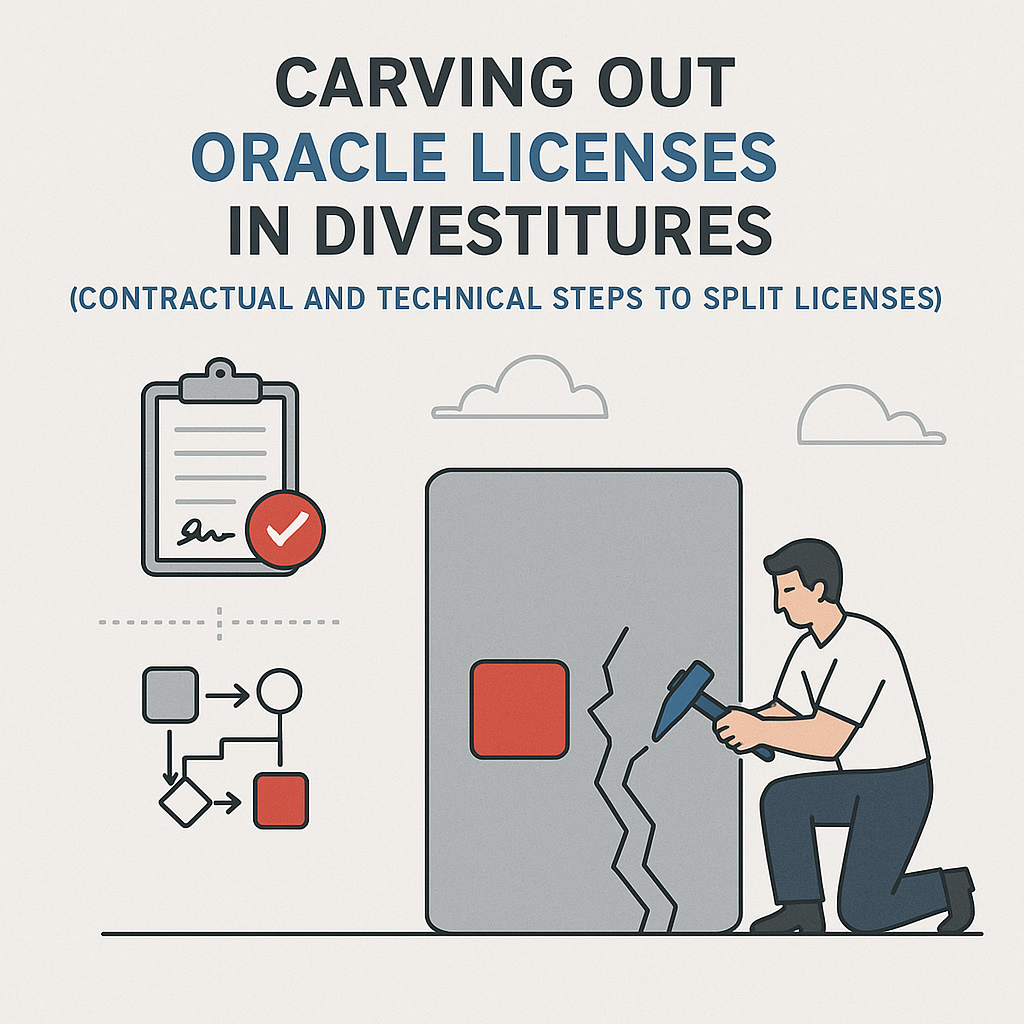
Carving Out Oracle Licenses in Divestitures
Executive Summary:
When a business unit is divested, CIOs must ensure that the departing entity has the necessary Oracle licenses to operate independently while protecting the parent from compliance risks.
This guide explains how to split Oracle licensing during a divestiture—from contract steps, such as new license purchases or rare transfers, to managing transition periods and technical handovers—so that both the parent and the new company remain compliant.
Assessing License Ownership and Entitlements
Begin by identifying the Oracle licenses used by the divested unit and determining who holds them. If the unit has its own Oracle contracts, those can usually be transferred with the business (with Oracle notified).
More often, the unit was covered under the parents’ Oracle licenses. In that case, the new entity has no direct rights, so you need to provide it with proper licenses after the split.
Providing Oracle Licenses to the New Company
In most divestitures, the new company must procure its own Oracle licenses to replace those it used under the parent (Oracle rarely permits a direct transfer of licenses).
Plan for the divested entity to be fully licensed on Day 1 of independence. Determine which Oracle products the newco will use and arrange the necessary license agreements in advance.
The parent should share usage details (e.g., user counts, processor requirements) to help the new company buy the right quantities. Ideally, the new company will negotiate with Oracle well in advance of the closing, ensuring everything is in place when the separation occurs.
Read Combining and Carving Out Oracle Licenses Post-M&A and Divestiture.
Transition Period and Temporary Use Agreements
During the handover, the divested unit may temporarily rely on the parent’s Oracle-based systems.
A Transition Services Agreement (TSA) should define this interim period. Oracle typically permits a grace period (approximately 90 days) after a divestiture, during which the new company can continue to use Oracle software under the parent’s licenses.
After that, the newco must stop using the parent’s Oracle programs (or obtain its licenses). If 90 days isn’t enough, negotiate an extension with Oracle and get it in writing.
Set a cutoff date in the TSA for when the newco’s access to the parent’s Oracle systems ends. Ensure both parties and Oracle agree on this timeline to avoid any unlicensed use beyond that point.
Splitting Systems and Support Contracts
Separating Oracle-powered systems requires careful timing. When splitting databases or applications for the new entity, any instance or copy of an Oracle system must be licensed by the new company once it is operating independently of the original entity.
Plan cutovers so that as soon as a system is under the new company’s control, the new company’s Oracle licenses take effect.
Additionally, ensure the new company has its own Oracle support from the outset. Oracle can set up a new support account for the newco’s licenses; coordinate this to prevent any lapse in support coverage.
The new company should have immediate access to Oracle updates and assistance, and the parent should not be paying for support that only benefits the new company.
Post-Divestiture Compliance and Communication
Communicate clearly with the new company’s IT team about which Oracle systems they can use and for how long under the transition arrangement.
For example, if the newco is allowed to use an Oracle database on the parent’s servers until June 30, everyone should be aware that as of July 1, that access will end. Provide a written timeline of these deadlines to prevent confusion.
The new organization should also assign someone to manage its Oracle licenses from the start. They will work with Oracle to establish new contracts and ensure the company remains within its entitlements.
Consequences for missing license transition deadlines can be severe. In one case, a divested unit missed a 60-day cutoff, and Oracle’s audit at day 90 held the parent accountable. The newco had to buy licenses immediately at great expense – a costly lesson for both parties.
Takeaway: Don’t let transition deadlines slip.
Finally, update Oracle on the divestiture and reassess the parent’s own Oracle licensing.
Remove the spun-off entity from your Oracle agreements (so it’s no longer listed as an authorized entity) and consider negotiating adjustments to your license counts or support costs at the next renewal if your usage drops significantly.
Oracle may not automatically reduce fees, but it’s worth requesting based on your reduced footprint.
Read Avoiding M&A Compliance Pitfalls.
Recommendations
- Inventory the Split: Catalog all Oracle software used by the divested unit and its licensing details. This outlines the licenses that the newco must obtain and those that remain with the parent.
- Review Contract Clauses: Check Oracle agreements for divestiture or assignment clauses. Follow any notice requirements and see if any licenses are transferable under your contract.
- Secure New Licenses Early: Don’t wait until after closing – help the new company line up the Oracle licenses it needs beforehand. Ensure they’re fully licensed on Day 1.
- Leverage a TSA: Use a Transition Services Agreement to set a clear limit (e.g., 90 days) on using the parent’s Oracle systems. Get Oracle’s written approval if more time is needed.
- Align Cutover with Licensing: Time the migration of systems and data so that the new company’s Oracle environments go live only when that company’s own licenses are active.
- Split Support Responsibly: Collaborate with Oracle to transfer or establish support contracts for the new company’s licenses. Ensure the new entity has no gaps in support coverage.
- Document and Communicate: Document each party’s Oracle-related obligations and deadlines. Inform the new company in writing when to cease using any Oracle software under the parent’s licenses.
- Adjust the Parent’s License Plan: Re-evaluate the parent’s Oracle license needs post-divestiture. Update Oracle’s records to remove the divested entity and negotiate contract or support adjustments if appropriate.
Read about our Oracle Advisory Services.
